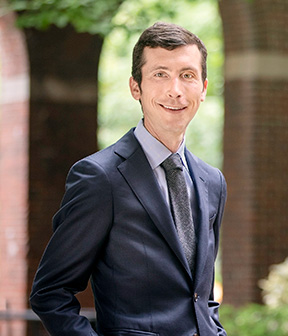Tax Plus: Daniel Hemel’s broad-ranging scholarship explores the central issue of redistribution
In recent years, Daniel Hemel has had a chance to kick the tires at a number of law schools. A member of the full-time faculty at the University of Chicago Law School since 2015, he was a visiting professor at Harvard Law School in Fall 2019, at Stanford Law School in Winter 2020, and at NYU Law during the 2021–22 academic year. In June, he joined the NYU Law faculty as a tenured professor of law.
Hemel will add to the ranks of the Law School’s already globally renowned tax faculty. But his teaching and research also include intellectual property, administrative law, and nonprofit organizations. While visiting at NYU Law, he taught Income Taxation, a Tax Policy Seminar, and Torts. “Daniel is not only one of the country’s leading tax experts, but also an extraordinary polymath,” says Wayne Perry Professor of Taxation Daniel Shaviro. “His creativity, productivity, range, and depth are pretty hard to match.”
“The central question that I’m interested in is redistribution, and that’s mostly a tax question—but not exclusively a tax question,” Hemel explains. In a recent University of Chicago Law Review article, for example, he discusses whether nontax administrative rules should be designed solely to maximize efficiency, or whether they should also factor in concerns about income distribution. While much of his work focuses on wealth and income disparities, Hemel says he has also examined “inequality between the long lived and short lived, which isn’t a dimension of inequality that we normally think about.” In a forthcoming article in the Stanford Law Review titled “Valuing Medical Innovation,” he and Stanford Law Professor Lisa Ouellette argue that the US drug-pricing system creates impediments to pharmaceutical innovation that “not only slow the growth of US life expectancy but also exacerbate racial disparities in health outcomes.” Part of the article focuses on incentivizing development of vaccines, including for COVID-19.
COVID is one of many topics that Hemel has addressed as a regular opinion contributor to the Washington Post, and he has published commentary in the New York Times, the Wall Street Journal, Slate, and Politico as well. “I view myself as a welfarist and mostly a utilitarian, and I want to increase the amount of happiness and decrease the amount of suffering in the world,” Hemel says. “And it’s really hard to do that if you’re only talking to other law professors.”
Hemel earned his law degree from Yale Law School in 2012, where he was editor in chief of the Yale Law Journal, after earning an M.Phil. in international relations as a Marshall Scholar at the University of Oxford. He clerked for Judge Michael Boudin of the US Court of Appeals for the First Circuit, Judge Sri Srinivasan of the US Court of Appeals for the District of Columbia Circuit, and Justice Elena Kagan of the US Supreme Court. In 2013, he was a visiting counsel at the Joint Committee on Taxation of the US Congress.
Among the things that drew Hemel to NYU Law, he says, is the school’s “rich intellectual environment.” He notes, “There’s just more intellectually going on at NYU than at other fantastic law schools with which I’ve been associated.” The substantial size of NYU Law’s tax faculty was also an attraction, Hemel says, as was the fact that tax law is an elective available to first-year students, which is unusual. “My experience teaching tax here has been different from elsewhere, because I have some students whose enthusiasm for tax is what brought them to NYU,” he says.
Hemel “possessed a reputation as a thorough, open-minded, and kind teacher,” says Ugonna Eze, a 2021 Chicago Law graduate who took three classes with Hemel. “He always brought a sense of wonder and excitement to the classroom. The NYU community is exceptionally lucky to have him.”
One more factor that helped lure Hemel from Chicago: “My spouse and I care a lot about good bagels, so that was a real attraction of NYU,” he says. “I feel like in terms of location for good bagels, it is the best in the country—we even beat other New York–area law schools.”
Posted September 8, 2022


